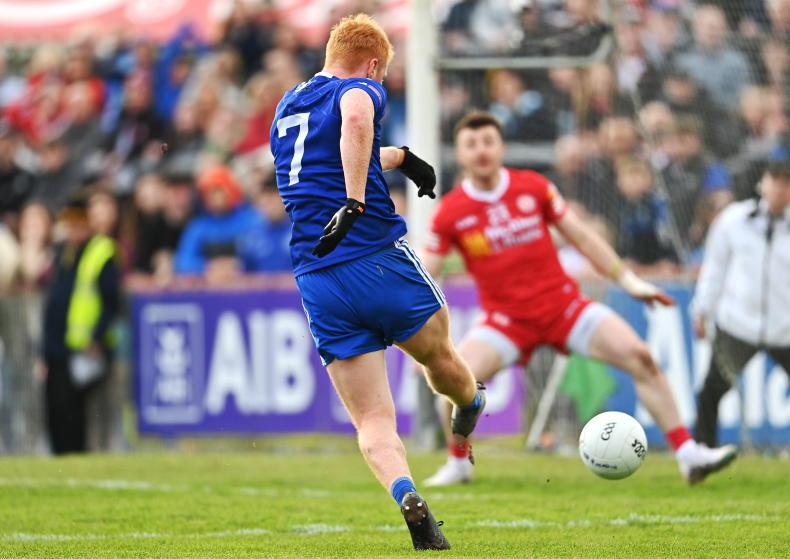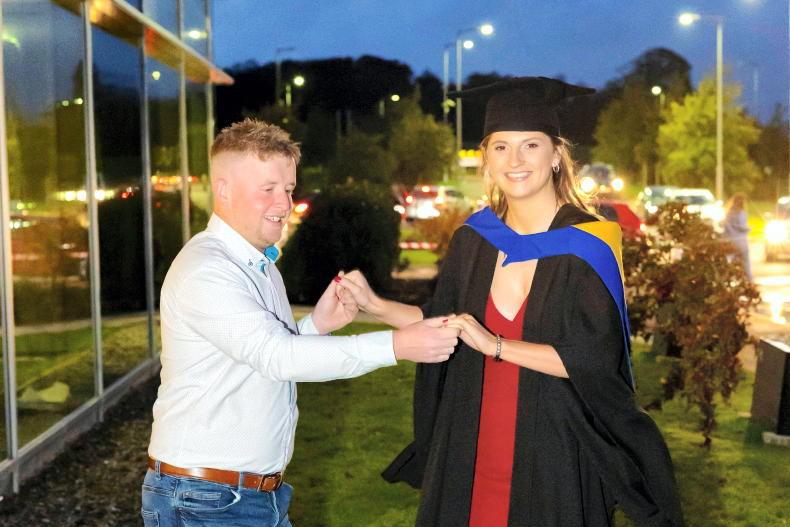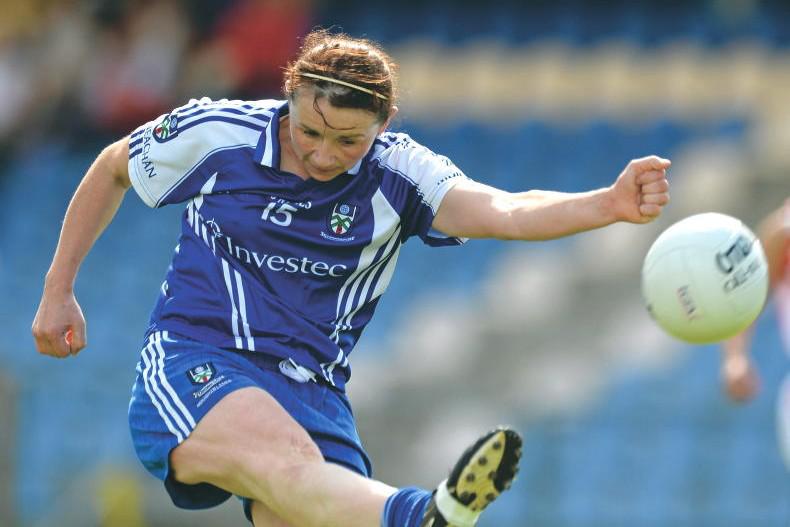Given the stakes involved in top-level sport, it’s all too common to see players take the option that has the highest percentage of success, even if the return is lower.
A golfer will generally play to avoid a bogey rather than go bald-headed for a birdie; an American football team will punt on fourth down instead of risking the ball being turned over and the opposition having good field position; a tennis player might try for the ace on first serve but he or she will make sure the second serve is put in play.
In the commentary surrounding Gaelic football, a common lament over the past decade or so is the prevalence of ‘safe’ play – packing the defence, keeping possession even if that means a sideways or backwards handpass and only shooting if the chance is on.
The spectacle has been eroded as a result and initiatives like the mark – rewarding high catching and kick-passing – have been introduced in direct response.
Even so, pragmatism usually wins out and coaches will always find a way to satisfy their own ends within the parameters laid out.
All of these things are why the concluding moments of the Tyrone-Monaghan game in the Ulster SFC last Sunday was so exciting. Deep into injury time, the home side led by a point in Healy Park as Monaghan launched one last attack, ostensibly in search of the point that would send the game to extra time.
When the ball was worked to Ryan O’Toole within scoring range, the expectation was that he would fist the ball over the bar, especially as he is a wing-back.
Brave move
However, fearless of the consequences, he went for goal and was rewarded with a blistering strike which nestled in the back of the net. Fortune certainly had favoured the brave and, who knows, maybe others will take inspiration from it this championship season.
Certainly, if Limerick are to be knocked off their perch in hurling, the challengers will need to take chances.
In terms of a Munster SHC opener, we could scarcely have wished for a better proposition as Waterford ‘host’ the All-Ireland champions at FBD Semple Stadium on Sunday (Walsh Park is unavailable due to developmental works).
With Davy Fitzgerald back in charge of the Déise, it’s the perfect box-office clash to signal that the hurling championship is up and running. In 2021, Waterford ran Limerick closest and then won the league, but were unable to carry that into the subsequent championship.
They still have potential, but Limerick are probably even better than two years ago – as shown in the manner in which they won this year’s league.
When he was Wexford manager, Fitzgerald was sometimes accused of being too cautious in big games, and such an approach has little chance of working against Limerick.
The Shannonsiders will show up and score their 30 points, and the only way they won’t win is if the opposition score more, something which is very difficult to do against such a powerhouse.
In the 2000s, when Waterford burst forth from being also-rans to regular challengers, their ability to plunder goals was a key factor, and it’s likely to be similar if they are to rattle Limerick. We can’t wait.
Women’s rugby vs ‘old-boys’ mentality
Last week, I had the pleasure of speaking to Finny Hurley (no relation).
Along with Margaret White, he guided the West Cork Rebelettes to a Munster U14 girls’ rugby league and cup double, secured with a cup final victory over Garryowen three weeks ago.
What made the achievement all the more impressive was the fact that the team is a confederation of the clubs of Dunmanway and Bantry Bay, competing together since the beginning of the 2021-22 season.
Given the progress made, Finny is optimistic that this can be the beginning of something.
“The main thing is that, with all the talk about promoting women’s sport in this country, there’s nothing better than this group of girls,” he said.
“What they’ve done, it’s never been done down here, to win the league and the cup is unreal.
“Any kids seeing this will think, ‘I wouldn’t mind having a go at this.’”
Contrast
It’s a positive story, but it stands in stark contrast to an article that appeared in the Daily Telegraph last Thursday, shining a light on quite a few of the unsavoury aspects of women’s rugby at a national level right now.
John Cronin, the director of rugby at Dublin club Railway Union, pointed out that there is an “old-boys culture” pervading the IRFU, with a lack of understanding around the differences between diversity – merely putting women with no involvement in rugby into roles – and inclusion, whereby stakeholders in women’s rugby would have a say.
The IRFU does have a sub-committee for women’s rugby – albeit not listed on the organisation’s website – but members are appointed rather than elected, and there is no representative from any of the clubs from the Women’s All-Ireland League.
Other issues might be considered small problems, such as a player asking for a protein supplement and being refused or a player being left off an email list, but when added together they paint a picture of a set-up that is not in top working order.
That is underlined by the fact that, across this year’s Ireland squad, the average number of caps per player is six, compared with 37 for England. A third straight Six Nations defeat last weekend, 24-7 against Italy, means that Ireland are in a battle with Scotland to avoid the wooden spoon.
The Daily Telegraph article mentioned how at a dinner at Bective Rangers recently, IRFU president John Robinson spoke, noting the progress made in terms of awarding full-time contracts to players on the Ireland women’s team. A prominent figure in the Irish game is said to have commented, “Who gives a f*** about women’s rugby?”
It’s a question that can only be answered with actions rather than words.
Given the stakes involved in top-level sport, it’s all too common to see players take the option that has the highest percentage of success, even if the return is lower.
A golfer will generally play to avoid a bogey rather than go bald-headed for a birdie; an American football team will punt on fourth down instead of risking the ball being turned over and the opposition having good field position; a tennis player might try for the ace on first serve but he or she will make sure the second serve is put in play.
In the commentary surrounding Gaelic football, a common lament over the past decade or so is the prevalence of ‘safe’ play – packing the defence, keeping possession even if that means a sideways or backwards handpass and only shooting if the chance is on.
The spectacle has been eroded as a result and initiatives like the mark – rewarding high catching and kick-passing – have been introduced in direct response.
Even so, pragmatism usually wins out and coaches will always find a way to satisfy their own ends within the parameters laid out.
All of these things are why the concluding moments of the Tyrone-Monaghan game in the Ulster SFC last Sunday was so exciting. Deep into injury time, the home side led by a point in Healy Park as Monaghan launched one last attack, ostensibly in search of the point that would send the game to extra time.
When the ball was worked to Ryan O’Toole within scoring range, the expectation was that he would fist the ball over the bar, especially as he is a wing-back.
Brave move
However, fearless of the consequences, he went for goal and was rewarded with a blistering strike which nestled in the back of the net. Fortune certainly had favoured the brave and, who knows, maybe others will take inspiration from it this championship season.
Certainly, if Limerick are to be knocked off their perch in hurling, the challengers will need to take chances.
In terms of a Munster SHC opener, we could scarcely have wished for a better proposition as Waterford ‘host’ the All-Ireland champions at FBD Semple Stadium on Sunday (Walsh Park is unavailable due to developmental works).
With Davy Fitzgerald back in charge of the Déise, it’s the perfect box-office clash to signal that the hurling championship is up and running. In 2021, Waterford ran Limerick closest and then won the league, but were unable to carry that into the subsequent championship.
They still have potential, but Limerick are probably even better than two years ago – as shown in the manner in which they won this year’s league.
When he was Wexford manager, Fitzgerald was sometimes accused of being too cautious in big games, and such an approach has little chance of working against Limerick.
The Shannonsiders will show up and score their 30 points, and the only way they won’t win is if the opposition score more, something which is very difficult to do against such a powerhouse.
In the 2000s, when Waterford burst forth from being also-rans to regular challengers, their ability to plunder goals was a key factor, and it’s likely to be similar if they are to rattle Limerick. We can’t wait.
Women’s rugby vs ‘old-boys’ mentality
Last week, I had the pleasure of speaking to Finny Hurley (no relation).
Along with Margaret White, he guided the West Cork Rebelettes to a Munster U14 girls’ rugby league and cup double, secured with a cup final victory over Garryowen three weeks ago.
What made the achievement all the more impressive was the fact that the team is a confederation of the clubs of Dunmanway and Bantry Bay, competing together since the beginning of the 2021-22 season.
Given the progress made, Finny is optimistic that this can be the beginning of something.
“The main thing is that, with all the talk about promoting women’s sport in this country, there’s nothing better than this group of girls,” he said.
“What they’ve done, it’s never been done down here, to win the league and the cup is unreal.
“Any kids seeing this will think, ‘I wouldn’t mind having a go at this.’”
Contrast
It’s a positive story, but it stands in stark contrast to an article that appeared in the Daily Telegraph last Thursday, shining a light on quite a few of the unsavoury aspects of women’s rugby at a national level right now.
John Cronin, the director of rugby at Dublin club Railway Union, pointed out that there is an “old-boys culture” pervading the IRFU, with a lack of understanding around the differences between diversity – merely putting women with no involvement in rugby into roles – and inclusion, whereby stakeholders in women’s rugby would have a say.
The IRFU does have a sub-committee for women’s rugby – albeit not listed on the organisation’s website – but members are appointed rather than elected, and there is no representative from any of the clubs from the Women’s All-Ireland League.
Other issues might be considered small problems, such as a player asking for a protein supplement and being refused or a player being left off an email list, but when added together they paint a picture of a set-up that is not in top working order.
That is underlined by the fact that, across this year’s Ireland squad, the average number of caps per player is six, compared with 37 for England. A third straight Six Nations defeat last weekend, 24-7 against Italy, means that Ireland are in a battle with Scotland to avoid the wooden spoon.
The Daily Telegraph article mentioned how at a dinner at Bective Rangers recently, IRFU president John Robinson spoke, noting the progress made in terms of awarding full-time contracts to players on the Ireland women’s team. A prominent figure in the Irish game is said to have commented, “Who gives a f*** about women’s rugby?”
It’s a question that can only be answered with actions rather than words.









SHARING OPTIONS